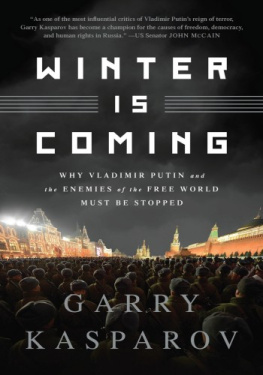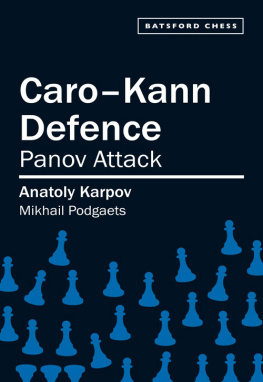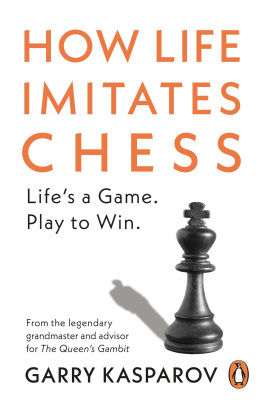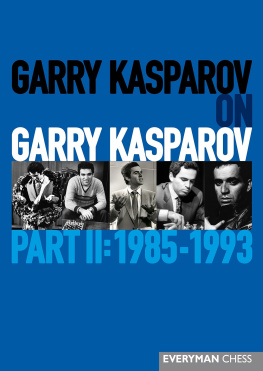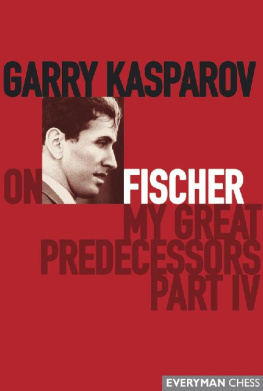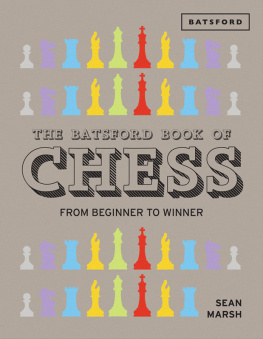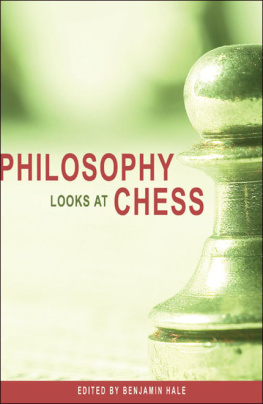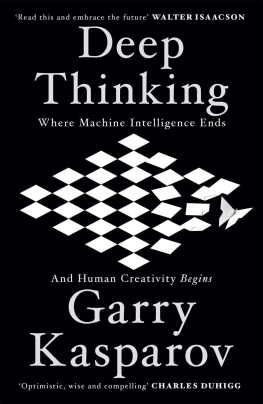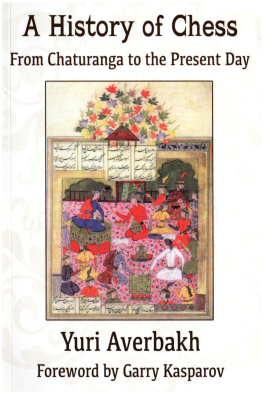Also by Fred Waitzkin
Searching for Bobby Fischer
The Last Marlin
The Dream Merchant
MORTAL GAMES
THE TURBULENT GENIUS OF GARRY KASPAROV
FRED WAITZKIN
Copyright 1993 by Fred Waitzkin
All rights reserved, including the right of reproduction in whole or part in any form. For information, address International Creative Management, 730 Fifth Avenue, New York, NY 10019.
Print ISBN: 9780786754878
ebook ISBN: 9780786754977
Distributed by Argo Navis Author Services
Contents
I would like to acknowledge the contribution of Bonnie Waitzkin, whose creative input, smart editorial judgments and loving encouragement made this book possible.
My thanks also to Bruce Pandolfini, a gifted man, who spent many hours helping me translate the drama and daunting intricacy of Garry Kasparovs chess into accessible language.
For Stella, Bonnie, Katya and Josh
In late September, 1990, world chess champion Garry Kasparov and I were walking along the broad South Beach of Marthas Vineyard Island off the coast of Massachusetts. It was a sunny morning that was both warm and chilly, depending on the blustery ocean breeze, and the air was so clear that Nomans Island, nine miles to the south, seemed to be sitting just off the beach. Kasparov, on the short side of medium height, shirtless and muscular, walked along the waters edge at a pace that was nearly a run. He had been smiling for the past few minutes, enjoying an idea.
Im going to crush him this time, he said.
In ten days the world champion would begin a three-month intellectual and emotional battle against a man he considered morally and politically evil, a symbol of the communist system. He pronounced the name slowly, rolling the r, K-A-R-R-R-P-O-V, so that it dripped with disgust, as if the challenger, one of the great players in chess history, were something vile and foul-smelling. He is a creature of darkness, Kasparov said, with Miltonic distaste.
The fifth title match between these two chess giants would begin in New York in ten days and would conclude in Lyon, France, at Christmastime. Kasparovs strategy going in was rather simple: I want to kill him immediately. To this end, Kasparov was planning to begin the match with a blitzkrieg, a first-round knockout. In the early games he intended to use several lethal new opening ideas that he had developed on Marthas Vineyard; chess players call them novelties. After overwhelming Karpov, a former world champion and defensive genius, in two or three of the early games, the champion predicted that the challenger would be unable to recover psychologically. K-A-R-P-O-V. He repeated the name with disdain, but this time flashed a mischievous smile.
As I struggled to keep up with him on the soft sand, Kasparov savored his victory as if it were a fait accompli and Karpov were already squashed like a roach, once and for all out of his life. Sea gulls wheeled overhead, yapping and diving for sand eels. Kasparov waved at them like a heedless child and then inhaled the sea air deeply and theatrically as if it were great French food. This past month on Marthas Vineyard, the hard work and island living had brought a feeling of renewal and confidence. For the last few weeks, he had been saying to close friends that he would win by a lopsided margin. But, privately, his friends were uneasy about the match.
Political changes in the Soviet Union had distracted Kasparov from chess and he had not trained nearly as much as he had planned. Objectively, there was no reason to expect that the match would be easy. Kasparov had been unable to overwhelm Anatoly Karpov in their previous four championship bouts, each of them exhausting and very competitive, which in aggregate encompassed 120 games, about 600 hours of playif you can call it play to plot the demise of another mans spiritual and psychological well-being. In 120 games, Kasparov had managed to win only a single game more than Karpov. Incredible. There had never been such a competition in all of professional sports: so many encounters, so many hours, so much on the line, so much hatred seeping from a game into life and then back into a game.
On Marthas Vineyard, it seemed to Kasparov that he had spent half of his twenty-seven years and sacrificed much of his lifes joy trying to rid himself of this sallow, physically frail man who stuck to him like a shadow. Half a lifetime sitting across from Karpov, whom he loathed, toes practically touching, conceiving his finest ideaswhich chess players would surely revere 100 years from todaywhile smelling Karpovs smells, listening to his digestion or to the incanting sound of Karpovs counting while he calculated variations, glimpsing the quivering of Karpovs stretched, nerve-wracked face when he was losing, or his preening, apple-cheeked self-admiration when he was winning. Half a lifetime watching closely for Karpovs mood swings as crucial clues to the game and to Kasparovs own well-being, for if Kasparov won he would feel like a god afterwards, and if he lost, his dejection, the blackness and rage closing upon him, would resist all forms of consolation from his friends, his wife, his mother. Such depths of despair and humiliation! After losing a game, Kasparov seemed to shrink in size. Then, as he wrestled with self-doubt, he would be vulnerable in the next game. Karpov would know this, of course, and would be ready to pounce.
In ten days, the fifth world championship match between them would begin, and Kasparov would strain to sense the meaning of Karpovs body English, the blankness of his face, his twitches and devious relaxations. For five hours in the evening, these two men would feel each others hidden meanings as keenly as any two lovers while all the while hating one another, but not so loudly that it might interfere with the flow of ideas.
Eight months before coming to this island, Kasparov, whose father was Jewish and mother was Armenian, had been forced to flee from his training camp in Baku, the city where he had been born and raised, when Azerbaijani hooligans had begun systematically slaughtering Armenians. He had experienced this nightmare not merely as the loss of home and training camp but as the loss of his heritage, part of himself. The event had shaken him, at least for a time dislodging the fundamental order in his life. When he had returned to Moscow, feeling, as he put it, like a refugee, chess hardly seemed important anymore. This game which had made him wealthy and powerful, which had been at the center of his life for twenty years and at which he had become arguably greater than any other man in history, had suddenly felt trivial to him.
In Moscow, with the match growing closer, there had been a choice to make each day: to study openings in preparation for Karpov, or to attend a political rally or an organizational meeting for a new political party, or to debate the policies of Gorbachev with visiting Western journalists. Chess was never his choice. According to his closest friends, prior to the loss of his home, his interest in the politics of his country, his anticommunist bias, had been somewhat cerebral and theoretical. But in January of 1990 the new Russian revolution had taken possession of his imagination. Soviet history was suddenly evolving at the speed of light after decades of bleak, punishing stasis. It was thrilling to Kasparov, who sensed that the end of communism was close. He told this to skeptical Western journalists and warned that support of Gorbachevs reactionary politics could force a bloody civil war. He felt most purposeful when writing political columns for Soviet and Western newspapers or giving rousing speeches in front of large crowds. When he thought about it, it seemed odd that he wasnt nervous before his speeches, though he wasnt exactly sure what he would say until he began. This life came easily to him, as though he had spent his years in the political trenches instead of leaning over a chessboard quietly calculating variations. In the fight against communism he felt connected with his passionately anticommunist father, who had died when he was seven, and found himself thinking back twenty years to nightly political discussions at the dinner table with his grandfather, who had been a staunch Party member for nearly fifty years.
Next page

